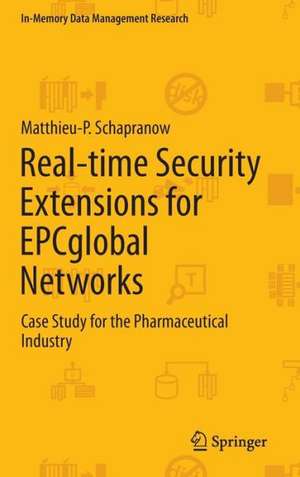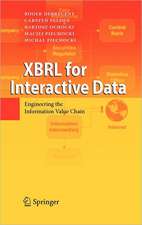Real-time Security Extensions for EPCglobal Networks: Case Study for the Pharmaceutical Industry: In-Memory Data Management Research
Autor Matthieu-P. Schapranowen Limba Engleză Hardback – 3 iul 2013
This book contributes to this proposition as follows: it defines the design of transparent real-time security extensions for EPCglobal networks based on in-memory technology. For that, it defines authentication protocols for devices with low computational resources, such as passive RFID tags, and evaluates their applicability. Furthermore, it outlines all steps for implementing history-based access control for EPCglobal software components, which enables a continuous control of access based on the real-time analysis of the complete query history and a fine-grained filtering of event data. The applicability of these innovative data protection mechanisms is underlined by their exemplary integration in the FOSSTRAK architecture.
| Toate formatele și edițiile | Preț | Express |
|---|---|---|
| Paperback (1) | 380.84 lei 6-8 săpt. | |
| Springer Berlin, Heidelberg – 15 iul 2015 | 380.84 lei 6-8 săpt. | |
| Hardback (1) | 388.13 lei 6-8 săpt. | |
| Springer Berlin, Heidelberg – 3 iul 2013 | 388.13 lei 6-8 săpt. |
Preț: 388.13 lei
Nou
Puncte Express: 582
Preț estimativ în valută:
74.27€ • 77.75$ • 61.45£
74.27€ • 77.75$ • 61.45£
Carte tipărită la comandă
Livrare economică 05-19 aprilie
Preluare comenzi: 021 569.72.76
Specificații
ISBN-13: 9783642363429
ISBN-10: 3642363423
Pagini: 160
Ilustrații: XXII, 146 p.
Dimensiuni: 155 x 235 x 17 mm
Greutate: 0.42 kg
Ediția:2014
Editura: Springer Berlin, Heidelberg
Colecția Springer
Seria In-Memory Data Management Research
Locul publicării:Berlin, Heidelberg, Germany
ISBN-10: 3642363423
Pagini: 160
Ilustrații: XXII, 146 p.
Dimensiuni: 155 x 235 x 17 mm
Greutate: 0.42 kg
Ediția:2014
Editura: Springer Berlin, Heidelberg
Colecția Springer
Seria In-Memory Data Management Research
Locul publicării:Berlin, Heidelberg, Germany
Public țintă
ResearchCuprins
Introduction.- Related Work.- Security in EPCglobal Networks.- Device-level Extensions.- Business-level Extensions for Event Repositories.- Qualitative and Quantitative Discussion.- Evaluation.- Conclusion.- Appendices.
Notă biografică
Matthieu-P. Schapranow received the BS and MS degrees in software engineering from the Hasso Plattner Institute, Potsdam, Germany in 2006 and 2008, respectively, and successfully defended his PhD thesis in September 2012. Since June 2012 he is principal investigator of in-memory technology for life sciences at the chair of Professor Plattner at the Hasso Plattner Institute. Currently, he is a visiting scientist at the Charité - Universitätsmedizin Berlin at the institute of pathology.
Textul de pe ultima copertă
The transformation towards EPCglobal networks requires technical equipment for capturing event data and IT systems to store and exchange them with supply chain participants. For the very first time, supply chain participants thus need to face the automatic exchange of event data with business partners. Data protection of sensitive business secrets is therefore the major aspect that needs to be clarified before companies will start to adopt EPCglobal networks.
This book contributes to this proposition as follows: it defines the design of transparent real-time security extensions for EPCglobal networks based on in-memory technology. For that, it defines authentication protocols for devices with low computational resources, such as passive RFID tags, and evaluates their applicability. Furthermore, it outlines all steps for implementing history-based access control for EPCglobal software components, which enables a continuous control of access based on the real-time analysis of the complete query history and a fine-grained filtering of event data. The applicability of these innovative data protection mechanisms is underlined by their exemplary integration in the FOSSTRAK architecture.
This book contributes to this proposition as follows: it defines the design of transparent real-time security extensions for EPCglobal networks based on in-memory technology. For that, it defines authentication protocols for devices with low computational resources, such as passive RFID tags, and evaluates their applicability. Furthermore, it outlines all steps for implementing history-based access control for EPCglobal software components, which enables a continuous control of access based on the real-time analysis of the complete query history and a fine-grained filtering of event data. The applicability of these innovative data protection mechanisms is underlined by their exemplary integration in the FOSSTRAK architecture.
Caracteristici
Introduces into the design and implementation of the history-based access control Helps to understand security risks and countermeasures in EPCglobal networks Provides inspiration and guidance to develop real-time business applications with in-memory technology Includes supplementary material: sn.pub/extras
















